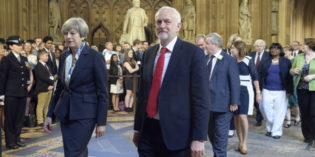EU referendum

A changing democracy: the British political tradition has never been more vulnerable
Never before has the British political tradition been more contested, write Matthew Hall, David Marsh and Emma Vines. They explain that British democracy is facing three major challenges – Scottish independence, Brexit, and anti-politics – and these have the potential to force change on an otherwise stale political establishment.

Why the Grieve amendment to the EU Withdrawal Bill is not unconstitutional
On Wednesday, 20 June, the House of Commons will consider again amendments to the EU Withdrawal Bill intended to give Parliament a meaningful vote on the Brexit negotiations, particularly in the case of no deal being agreed. Ben Margulies considers the constitutional implications of these highly contentious proposals.

Book Review | Brexit and Beyond: Rethinking the Futures of Europe edited by Benjamin Martill and Uta Staiger
In Brexit and Beyond: Rethinking the Futures of Europe, editors Benjamin Martill and Uta Staiger bring together contributors to consider the possible implications of Brexit for the futures of Europe and the European Union. Available to download, the book’s interdisciplinary approach makes clear the difficulties of predicting the potential outcomes of an unfolding process while nonetheless outlining a number of different scenarios and possibilities in detail, writes Anna Nadibaidze.

The Scottish Parliament has rejected the Brexit bill – are we heading for a second independence referendum?
The Scottish Parliament has denied consent to the EU Withdrawal Bill. Akash Paun argues that the Prime Minister now faces an unpalatable choice: concede defeat or help the SNP make the case for a second independence referendum.

Are discretionary referendums on the EU becoming ‘politically obligatory?’
Do governments call referendums on EU matters because contextual circumstances make them ‘politically obligatory’ or because ruling politicians believe they are the ‘appropriate’ decision-making mechanism? Aude Bicquelet-Lock and Helen Addison argue that, contrary to these suggested reasons, politicians have the freedom to choose whether and when to use referendums strategically to achieve their domestic and European policy objectives.

Brexit means a bleak future for UK public spending and probably for intra-UK governance relations
In the London-centric world of the UK-wide and English media, too little consideration has yet been given to what Brexit means for public spending (almost all of it bad), and for UK-devolved government relations. David Heald explains the need to focus on the long-term important issues.

Referendums, though they may be political lifeboats, can be very bad for democracy
Britain has an uncodified constitution. No one is exactly clear – when is it proper for a government to hold a referendum? In the absence of clarity, all seek to take advantage, to the detriment of well-functioning democracy. Consequently, while referendums may be treated as political lifeboats, they can be very bad for democracy, argues Peter Wiggins.

The good, the bad and the ugly arguments for ditching the EU Charter of Fundamental Rights
One of the most contentious pieces of legislation to be put before Parliament – the EU (Withdrawal) Bill – now faces scrutiny and probable amendments in the Lords. From a human rights perspective, writes Joelle Grogan (Middlesex University), one of the most concerning aspects of the Bill is the exclusion of the European Union Charter of Fundamental Rights from the corpus of EU law to be incorporated into UK law. She assesses the arguments being made to exclude it, concluding that the only plausible explanation for rejection of Charter rights is the rejection of rights.

Immobility and support for Leave: Brexit was partly a reaction to change from the locally rooted
Popular explanations of the Brexit vote have centred on the division between cosmopolitan internationalists who voted Remain, and geographically-rooted individuals who voted Leave. Katy Morris, Neil Lee, and Thomas Kemeny write that residential immobility also matters. They explain why those living in their county of birth were more likely to support Leave. However, the impact of immobility was filtered […]

How Parliament’s campaign of attrition forced the government to open up about Brexit
The real battle over Brexit has not been about whether Parliament will get a final vote, writes Ben Worthy (Birkbeck University of London). The true fight is about information – about what kind of Brexit the government wants, and what its impact is likely to be. In this, Parliament has been rather successful. Pressure from select committees and […]


 Democratic Audit's core funding is provided by the Joseph Rowntree Charitable Trust. Additional funding is provided by the London School of Economics.
Democratic Audit's core funding is provided by the Joseph Rowntree Charitable Trust. Additional funding is provided by the London School of Economics.